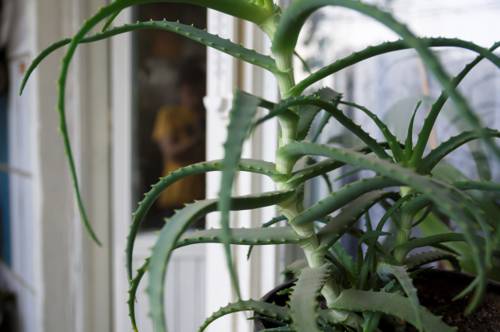
FAQ About Indoor Plant Stress Hormones

What are stress hormones in indoor plants?
Stress hormones in indoor plants are chemicals produced by plants in response to various stress factors such as drought, temperature changes, pollution, or pest attacks. These hormones, including abscisic acid, ethylene, and jasmonic acid, help the plant adapt to unfavorable conditions by altering growth, metabolism, or triggering defense mechanisms.

How do stress hormones affect plant growth?
Stress hormones can significantly impact plant growth. They may slow down or alter growth patterns by redirecting energy and resources towards defense mechanisms. For example, abscisic acid can close stomata to reduce water loss during drought, which can impede photosynthesis and growth.

Can stress hormones enhance a plant's survival?
Yes, stress hormones can enhance a plant's survival by enabling it to adapt to adverse conditions. These hormones activate defense mechanisms, such as closing stomata to conserve water or producing chemicals to deter herbivores, increasing the plant's resilience.

What triggers stress hormone production in indoor plants?
Stress hormones are triggered by environmental stressors such as water deficiency, extreme temperatures, high salinity, pathogen attacks, or mechanical damage. These triggers cause the plant to activate its stress response systems, leading to hormone production.

How can I identify if my indoor plant is under stress?
Signs that an indoor plant is under stress include wilting, yellowing leaves, stunted growth, leaf drop, or abnormal coloring. Observing these symptoms may indicate the plant is reacting to stress through hormone production.

Are certain indoor plants more sensitive to stress hormones than others?
Yes, sensitivity to stress hormones can vary among plant species. Some plants have evolved more robust mechanisms to cope with stress, while others may be more sensitive and show stress symptoms more easily. For example, succulents are generally more resistant to water stress than many tropical houseplants.

Can stress hormone levels in plants be measured?
Yes, stress hormone levels in plants can be measured using various laboratory techniques, such as high-performance liquid chromatography (HPLC) and mass spectrometry. These methods allow scientists to quantify hormone levels and study their effects on plant physiology.

What role does abscisic acid play in plant stress responses?
Abscisic acid (ABA) is a key stress hormone involved in plant responses to drought and salt stress. It regulates stomatal closure to prevent water loss and activates genes involved in stress tolerance, helping the plant conserve resources during adverse conditions.

How does ethylene influence plant stress response?
Ethylene is a stress hormone that influences plant responses to stress by regulating processes such as leaf abscission, flower senescence, and fruit ripening. Under stress conditions, elevated ethylene levels can lead to shedding of damaged leaves or fruits, thus helping the plant conserve energy.

What is the role of jasmonic acid in plant defense?
Jasmonic acid is crucial for plant defense against herbivores and pathogens. It acts by signaling the production of defense compounds such as protease inhibitors, which deter herbivores, and secondary metabolites that enhance resistance to diseases.

How can I reduce stress in indoor plants?
To reduce stress in indoor plants, ensure they receive adequate water, proper light, and nutrients, and maintain optimal temperature and humidity levels. Avoid overwatering, provide plenty of space, and consider using pest control measures if necessary.

Can artificial lighting affect the stress levels of indoor plants?
Yes, artificial lighting can affect stress levels in indoor plants. Incorrect light spectra, duration, or intensity can cause stress by disrupting photosynthesis and natural growth patterns. Using grow lights that mimic natural sunlight can help reduce such stress.

How do plants manage stress differently indoors compared to outdoors?
Plants indoors often face different stress factors compared to outdoor ones, such as limited light, air circulation, and space. This can lead to higher levels of stress hormones being produced as plants adapt to these artificial conditions. Adequate care tailored to these specific needs can help manage indoor plant stress.

What is the impact of temperature fluctuations on indoor plant stress hormones?
Temperature fluctuations can trigger increased production of stress hormones like abscisic acid, leading to stress responses such as stomatal closure, reduced growth, and wilting. Stable temperature conditions can minimize these stress responses.

Do fertilizers influence stress hormone production in plants?
Yes, both deficiency and excess of nutrients can influence stress hormone production. Insufficient nutrients may increase stress hormone levels as the plant struggles to cope, while excess fertilizers can cause nutrient burn and stress symptoms, prompting similar responses.

How does pruning affect stress hormone levels in plants?
Pruning can temporarily increase stress hormone levels as the plant reacts to injury. However, when done correctly, it can eliminate damaged parts, promote healthier growth, and ultimately lead to reduced stress levels over time.

Can stress hormones affect the flavor of herbs like basil or mint grown indoors?
Yes, stress hormones can affect the flavor and aroma of herbs. Under stress, plants might produce more secondary metabolites, altering the taste and smell due to increased production of compounds responsible for their characteristic flavors.

Is it possible to induce stress in plants deliberately to enhance their characteristics?
Yes, controlled stress, known as hormesis, can sometimes enhance certain plant characteristics, such as increased resistance to pests or improved flavors in herbs. However, it must be carefully managed to avoid long-term damage or negative effects.

Are there any technologies available to help monitor plant stress levels indoors?
Technologies like sensor-based systems and smart plant monitors can track environmental conditions and plant health indicators to detect early signs of stress. These devices can provide data on light, temperature, and humidity, aiding in better plant care.

Could genetic engineering be used to alter stress hormone responses in plants?
Yes, genetic engineering has the potential to modify stress hormone pathways in plants to enhance their resilience to stressors. By altering specific genes associated with stress responses, scientists aim to develop plants that can better withstand environmental challenges.
